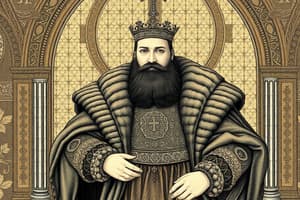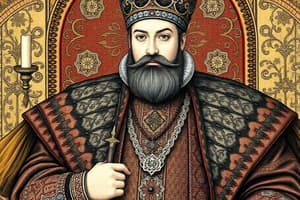Podcast
Questions and Answers
What were the primary causes of the Habsburg-Valois Wars?
What were the primary causes of the Habsburg-Valois Wars?
The primary causes were territorial disputes in Italy and religious differences, as the Habsburgs were Catholic and the Valois sought to expand their influence.
How did the political alliances formed during the Habsburg-Valois Wars affect the balance of power in Europe?
How did the political alliances formed during the Habsburg-Valois Wars affect the balance of power in Europe?
Political alliances often shifted, leading to a complex web of relationships that destabilized traditional power structures, diminishing the control of individual monarchs.
What role did the Italian Wars play in the emergence of centralized nation-states in Europe?
What role did the Italian Wars play in the emergence of centralized nation-states in Europe?
The Italian Wars prompted nations to consolidate power and establish centralized authority, as rulers sought to exert control over fragmented territories.
How did the outcome of the Habsburg-Valois Wars influence the political landscape of France?
How did the outcome of the Habsburg-Valois Wars influence the political landscape of France?
In what ways did the Italian Wars affect the economic conditions of participating European powers?
In what ways did the Italian Wars affect the economic conditions of participating European powers?
What strategic advantages did the Habsburgs gain from their conflicts with the Valois that contributed to their dominance in Europe?
What strategic advantages did the Habsburgs gain from their conflicts with the Valois that contributed to their dominance in Europe?
How did the marriage alliances during the Habsburg-Valois Wars impact the royal families involved?
How did the marriage alliances during the Habsburg-Valois Wars impact the royal families involved?
Discuss the significance of the Treaty of Cateau-Cambrésis and its implications for France and Spain.
Discuss the significance of the Treaty of Cateau-Cambrésis and its implications for France and Spain.
What caused the start of the Habsburg-Valois Wars?
What caused the start of the Habsburg-Valois Wars?
How did Charles V's marriage alliances contribute to his power?
How did Charles V's marriage alliances contribute to his power?
What was the significance of the Italian Wars for Europe?
What was the significance of the Italian Wars for Europe?
Explain the role of the Habsburgs in the preservation of political and religious unity in Western Christendom.
Explain the role of the Habsburgs in the preservation of political and religious unity in Western Christendom.
What were the primary challenges faced by Charles V in centralizing the HRE?
What were the primary challenges faced by Charles V in centralizing the HRE?
In what way did the family connections of the Habsburgs create tension in Europe?
In what way did the family connections of the Habsburgs create tension in Europe?
Identify the key territories under the control of Charles V during his reign.
Identify the key territories under the control of Charles V during his reign.
How did the outcomes of the Italian Wars affect the Habsburg-Valois rivalry?
How did the outcomes of the Italian Wars affect the Habsburg-Valois rivalry?
What was the primary outcome of the Treaty of Madrid in relation to François I's territorial ambitions?
What was the primary outcome of the Treaty of Madrid in relation to François I's territorial ambitions?
How did Charles VII's state-building efforts contribute to the expulsion of the English from France?
How did Charles VII's state-building efforts contribute to the expulsion of the English from France?
What strategic alliances did François I pursue in response to the opposition from Christian Europe?
What strategic alliances did François I pursue in response to the opposition from Christian Europe?
What role did Charles VIII's marriage to Anne of Brittany play in the consolidation of French territory?
What role did Charles VIII's marriage to Anne of Brittany play in the consolidation of French territory?
Describe the impact of the Italian Wars on François I's reign and French foreign policy.
Describe the impact of the Italian Wars on François I's reign and French foreign policy.
In what way did Louis XI consolidate power over the French nobility?
In what way did Louis XI consolidate power over the French nobility?
What was the significance of the Concordat of Bologna for the relationship between the French monarchy and the Catholic Church?
What was the significance of the Concordat of Bologna for the relationship between the French monarchy and the Catholic Church?
How did François I's patronage of the arts influence French culture during the Renaissance?
How did François I's patronage of the arts influence French culture during the Renaissance?
Flashcards are hidden until you start studying
Study Notes
Church Appointments in France
- Church policy was influenced by appointments in France, demonstrating control over the clergy.
- Papacy received the first year's income from newly appointed bishops and abbots in France.
The Tudors (1485-1603)
- War of the Roses (1455-1487) marked internal conflict post-Hundred Years War, primarily between the House of York and House of Lancaster.
- Henry VII emerged victorious in 1485 at the Battle of Bosworth Field, becoming the first Tudor king.
- Established the Court of Star Chamber to contain noble power and created a standing army to enforce law.
- Henry VII restored royal prestige and aimed for local governance order.
- Focused on educated advisors for royal council, enhanced treasury, and ensured peace upon death.
Henry VIII (1491-1547)
- Initially the second son, assumed throne due to brother's death.
- Centralized power but engaged in costly wars, leading to economic strain.
- Divorced Catherine of Aragon, who bore one daughter, for Anne Boleyn due to need for a male heir.
- Divorced catalyzed the English Reformation due to issues with the Catholic Church.
Charles VII of France (1407-1461)
- King during the latter part of the Hundred Years War, achieved its conclusion.
- Reorganized the royal council, enhancing state efficiency through increased taxation and lawmaker influence.
- Developed a state-sponsored military, securing French territorial integrity against England.
French Kings Post-Charles VII
- Louis XI, known as the "Spider King," used military force to impose submission on nobles and expanded French territory.
- Charles VIII initiated Italian Wars and married Anne of Brittany to consolidate connection to Brittany, died young.
- Louis XII succeeded Charles, maintained stability, extended Italian Wars, and married Anne of Brittany to secure alliances.
François I of Valois (1494-1547)
- Continued Italian Wars, resulting in treaty that renounced claims on various territories due to Habsburg strength.
- Formed an alliance with Ottomans, seeking support against a united Christian front.
- Key patron of the arts, promoting Italian Renaissance culture and inviting artists like Da Vinci to France.
- Sponsored exploration, notably Cartier’s voyages to New World (Quebec).
- Enacted Concordat of Bologna, granting France control over the Catholic Church.
Formation of Nation-States
- The Late Middle Ages/Renaissance led to the emergence of nation-states like France, England, and Spain, characterized by territorial sovereignty and citizen identity.
Notable Monarchies
The Habsburgs (1270s-1918)
- Originated as a small German family; gained prominence via wars and strategic marriages.
- Became Duke of Austria and controlled Vienna by the late 13th century.
- Frederik III of Habsburg crowned as the first HRE Emperor in the 1440s, maintaining the title until the empire's dissolution by Napoleon.
- Maximilian III's marriage to Mary of Burgundy expanded Habsburg territories, inciting conflict with France.
Charles V of Habsburg (1500-1558)
- Grandson of Maximilian, he aimed to unify Western Christendom against the Reformation.
- Managed a vast empire that included Spain, the HRE, and southern Italian territories.
- Attempted to centralize authority but faced challenges due to local governance structures.
The Valois (1328-1589)
- Faced a tumultuous beginning marked by bloody conflicts and power struggles within France.
Studying That Suits You
Use AI to generate personalized quizzes and flashcards to suit your learning preferences.




